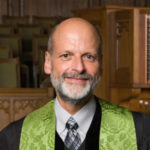 Good morning!
Good morning!
I hope this day finds you and your family well. I invite you to take a few moments with me to read and reflect upon today’s scripture selection — and to carry these thoughts with you into your day.
Today’s Scripture: 1 Corinthians 9:20-23
20 To the Jews I became as a Jew, in order to win Jews. To those under the law I became as one under the law (though I myself am not under the law) so that I might win those under the law. 21 To those outside the law I became as one outside the law (though I am not free from God’s law but am under Christ’s law) so that I might win those outside the law. 22 To the weak I became weak, so that I might win the weak. I have become all things to all people, that I might by all means save some. 23 I do it all for the sake of the gospel, so that I may share in its blessings.
Tim’s Devotional Reflection for Today
The apostle Paul often talked about himself in his letters to the churches—most of which he founded. He did that to help people know him better, give an example to follow, and defend himself against his detractors.
One can read between the lines in today’s scripture and imagine that some accused Paul of conforming to whatever crowd he was with on any given day. If he was with Jews, he fully kept the laws found in the Hebrew scriptures. If Paul was with Gentiles, he behaved and ate like a Gentile. If he were with the “weak,” those whose beliefs would keep them from eating meat sacrificed to false idols, for example, or those sociologically disadvantaged, Paul would become like one of them.
The critical thing Paul wants to get across is that he does this not to “fit in” but “for the sake of the gospel so that I can share its blessings.” Today we might call that contextual ministry, or meeting people where they are.
This passage of scripture is part of Paul’s discussion of eating meat sacrificed to idols. He is answering an ethical dilemma faced by the church at Corinth. In Corinth, like in other pagan cities of that day, there were many places of worship devoted to many different gods. Cultural life in those communities was built around those temples and shrines. Almost every social affair, banquet, party, or other celebration took place in some temple or shrine. And they ate at those events, and all the food they ate in those places was sacrificed or offered to an idol. It was the same for much of the food you could buy in the marketplace. As part of the food processing, almost all of it had been offered at some altar to some idol.
So this was troubling for some of the Christians in Corinth. And Paul, in his answer, identified two groups.
First, he talked about the “strong Christians.” These are the ones who were very strong in their faith and understood that there is no such thing as other gods; there is only one God. They knew that those idols were just stone or wood, and while it’s wrong to worship other gods, eating meat offered to one of those gods doesn’t matter because they’re not really gods. They’re not worshipping; they’re just eating meat that has been processed in that particular way.
But there is another group that he calls the “weaker ones.” These are the ones who also believe that there is only one God. These idols are not real. They also believe, as do the others, that it’s not appropriate to worship another god. But they feel like eating the meat offered to idols is too close to worshipping another god for comfort. And they found themselves feeling guilty about their former life when they worshipped those idols, which brought all that to mind for them. And they were torn up with guilt about that, so they believed they should not eat food sacrificed to idols.
Paul takes three chapters to answer this question in 1 Corinthians, telling us something of its importance to that church. The heart of what he says is found in the first few verses of chapter 8: “Now concerning meat that has been sacrificed to a false god: We know that we all have knowledge. Knowledge makes people arrogant, but love builds people up. If anyone thinks they know something, they don’t yet know as much as they should know. But if someone loves God, then they are known by God.”
See, Paul begins his answer by reminding those Corinthians who it is they follow. He gives them a lesson in discipleship. It is great to have knowledge. But Paul knew the danger of knowledge, and so he said, “knowledge makes people arrogant.” It makes you feel like you’re better than everyone else if you’re not careful.
On the other hand, Paul says, “love builds people up.” The NRSV translates it this way: “Knowledge puffs up, but love builds up.” Knowledge must be tempered by love and by caring.
In 1 Corinthians 13, Paul says, “Our knowledge is imperfect.” Yet we so often latch onto our knowledge as though it is perfect and others are wrong. We can even imagine that others are somehow inferior if they’ve not grown in the faith as much as we have. If we’re not careful, we can fall into thinking that they just haven’t arrived, and we are justified in looking down on them. That’s what was happening in the Corinthian church. They were so puffed up about what they knew that they couldn’t see into the hearts of their brothers and sisters. They had lost sight of the call as disciples to be caring people.
Paul’s ethic calls all Christians to use our hearts and our minds so that we have the heart of Christ and the heart of Christ meets people where they are.
Hymn: “God of Love and God of Power” by Gerald H. Kennedy (ca. 1939)
God of love and God of power,
Grant us in this burning hour
Grace to ask these gifts of Thee,
Daring hearts and spirits free.
Refrain
God of love and God of power,
Thou hast called us for this hour.
We are not the first to be
Banished by our fears from Thee;
Give us courage, let us hear
Heaven’s trumpets ringing clear.
Refrain
All our lives belong to Thee,
Thou our final loyalty;
Slaves are we whene’er we share
That devotion anywhere.
Refrain
God of love and God of power,
Make us worthy of this hour,
Offering lives if it’s Thy will,
Keeping free our spirits still.
Refrain
Thank you for sharing this moment of your day with me, with God, and with these reflections on a portion of scripture. I hope you will carry these with you throughout your day and night.
Grace and Peace,
![]()
Dr. Tim Bruster
Senior Pastor

